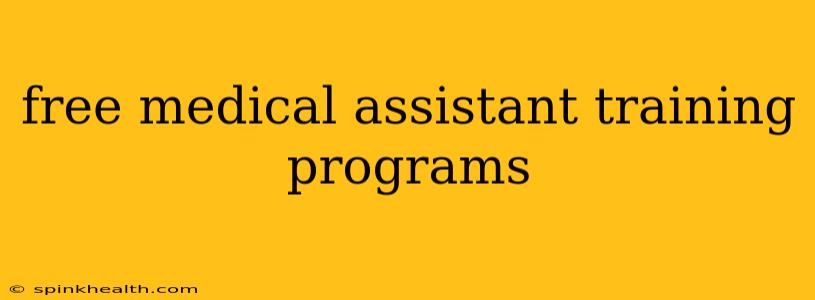Unlocking Your Healthcare Career: A Guide to Free Medical Assistant Training Programs
The world of healthcare is vast and rewarding, and a career as a Medical Assistant (MA) offers a fantastic entry point. But the cost of training can often feel like a significant hurdle. Fortunately, several avenues exist to pursue your dream of becoming an MA without breaking the bank. This guide explores the landscape of free or low-cost Medical Assistant training programs, dispelling the myth that affordable education is unattainable.
Where Can I Find Free Medical Assistant Training Programs?
This is the million-dollar question, and the answer isn't a simple "here's a list." Truly free comprehensive MA programs are rare. However, several options provide financial assistance or heavily subsidized training, effectively making them accessible at little to no cost for many individuals. Let's explore some avenues:
1. Government-Funded Programs: Many states and local governments offer grants and scholarships specifically for healthcare training. These programs often target low-income individuals or those from disadvantaged backgrounds. Research your local and state government websites for workforce development initiatives or healthcare training grants. These programs may not cover the entire cost, but the significant financial aid they offer can transform a seemingly insurmountable expense into a manageable one.
2. Non-profit Organizations: Numerous non-profit organizations and charities support aspiring healthcare professionals. These organizations often partner with vocational schools and community colleges to provide scholarships, grants, or tuition assistance for MA training programs. Look into organizations focused on healthcare education, workforce development in underserved communities, or those specifically aiding women or minorities in accessing healthcare careers.
3. Hospital and Clinic Sponsorships: Large hospital systems and clinics sometimes sponsor or partially fund MA training for individuals who commit to working for them after graduation. This is a great option, offering both education and guaranteed employment upon completion. Check the websites of local hospitals and clinics; many advertise apprenticeship-style programs or training partnerships.
4. Vocational Schools and Community Colleges with Financial Aid: While not entirely "free," many vocational schools and community colleges offer affordable MA programs and extensive financial aid options, including federal grants, loans, and work-study opportunities. Carefully investigate their financial aid packages, as many students qualify for substantial assistance that significantly lowers their overall cost.
What are the Differences Between Free and Paid Medical Assistant Programs?
The primary difference lies in the funding model. Free programs rely on government funding, grants, or sponsorships. Paid programs rely on student tuition as their primary funding source. However, even "paid" programs often offer extensive financial aid packages, making them surprisingly accessible.
Are There Any Online Free Medical Assistant Training Programs?
While complete, accredited online MA programs offering free tuition are scarce, you might find free online resources that supplement your learning. These could include online courses, tutorials, or practice tests. However, these are rarely sufficient to replace a full MA program and will not grant you certification. Be wary of programs promising full accreditation at no cost, as these may not meet standards and won't be recognized by employers.
How Can I Find Free Medical Assistant Training Programs Near Me?
The best approach is a multi-pronged one:
- Online Search: Use search terms like "free medical assistant training [your state/city]," "financial aid for medical assistant programs [your state/city]," and "medical assistant scholarships [your state/city]."
- Contact Local Hospitals and Clinics: Directly inquire about apprenticeship programs or training initiatives they may offer.
- Check State and Local Government Websites: Explore workforce development and healthcare training grant programs.
- Visit Vocational Schools and Community Colleges: Review their websites and inquire about financial aid opportunities.
Finding the right path to becoming a Medical Assistant might require some digging, but the rewards of a fulfilling healthcare career make the search worthwhile. Remember to thoroughly research any program before enrolling, ensuring its accreditation and alignment with your career goals. Your dedication and perseverance can unlock a brighter future in healthcare.

